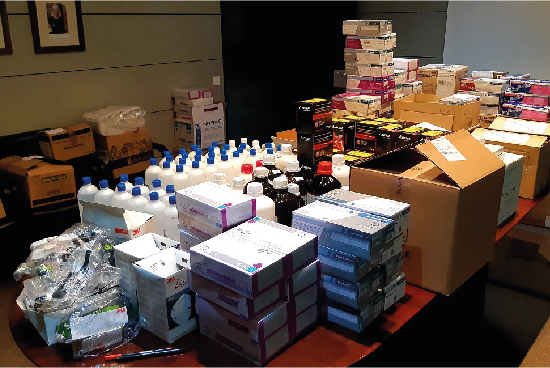
The CSIC Delegation in the Valencian Community has interviewed the management of each centre in the community.
Jose F. Marcos, the director of the Institute of Agrochemistry and Food Technology (CSIC), explains how IATA is adapting to the health emergency, what difficulties they are encountering, and what actions they are taking in the face of this crisis so that it ends as soon as possible.
How is IATA adapting to the current situation?
The past few weeks have been exceptional, and as Director I am proud of how IATA staff have adapted. We have completely rethought the work of the Institute with the priority of following the recommendations to stay home. We have reduced our presence in the Institute to a minimum, but at the same time trying to maintain our productivity. We have worked in three areas: In the area of scientific research, we have had to make a major reordering of the work, since we are a research centre for the life sciences and we live in the laboratories. We have also had to rethink the functioning of the personnel and services area, which is fundamental to our work. And, finally, we have worked in the area of coordination with the CSIC, as well as with the community and local authorities to try to help solve the crisis as far as we can. On Thursday 12 March, the Institute's Scientific Committee met and we considered that we were going to have to stop scientific activity. The experiments were stopped, except in exceptional cases where a lot of time, money and effort had been lost. We have had a couple of research groups that have asked to maintain a basal activity, and that has been respected. On Tuesday 17, following the indications of the General Secretariat of the CSIC, we already declared restricted access to the Institute. Right now, access to IATA is only possible for justified reasons and under the express authorization of the director. On Friday 13th I had already ordered all personnel who were risk groups to go home. All administration and service staff are teleworking thanks to VPN tools, and activity is being maintained, providers are being paid, and I am very happy with how things are being done. To set a positive tone, we scientists are always going through the motions, and this is a situation that allows us to catch up on backlogs, read scientific articles and reflect on new ideas.
What are the biggest difficulties you are encountering?
We have been surprised that, in such an exceptional situation, there are still many bureaucratic procedures that detract from the effectiveness of the actions we take. For example, in our case, we would have liked to have been able to make decisions and reduce the number of cleaning shifts at the centre, but since this is a centralised management contract, the ultimate decision rests with the company. There are more problems, we would have liked to have more bandwidth for teleworking, but in general people are responding very well.
We have had cases of investigators abroad with problems. We have a Chinese student who returned from her country in February and had to go into quarantine. We also have a researcher who was in Milan at the height of the crisis and had to quarantine her home as well. And two researchers who were abroad and managed to return to Spain just before the borders were closed. Fortunately, they are all well.
How is IATA contributing to the fight against COVID-19?
We have coordinated with the central organization of the CSIC and, through the Delegation, with the regional authorities, and we have already donated more than 10,000 gloves, we have given the General Hospital more than 100 liters of hydroaloholic solution, isopes for sampling and protective glasses. We have also donated a portable PCR device. And the last thing we have done has been to respond to the call of the central CSIC to look for volunteers to do PCR tests with our equipment, and I have a list of 49 volunteers who are willing to work as soon as the CSIC tells us 24 hours a day in shifts putting our thermal cyclers to work to make analyses. As I said, I am very proud of how we are responding, not only we, but all citizens, to the crisis. Finally, we have also submitted two research projects to the Carlos III Health Institute call for proposals.

